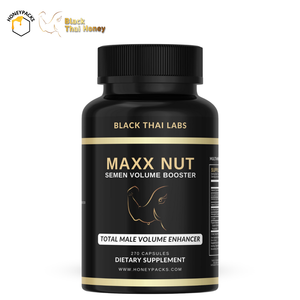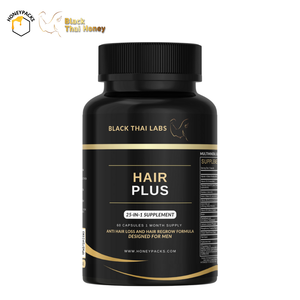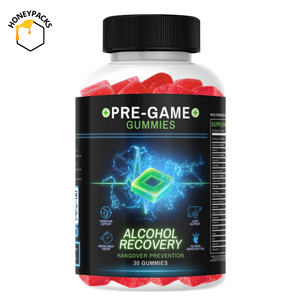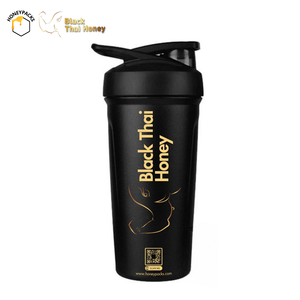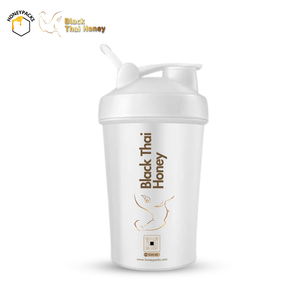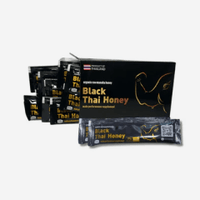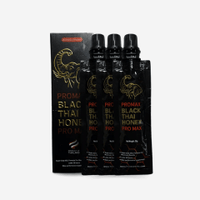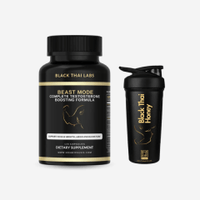Vitamin C for Testosterone Production: Enhancing Hormonal Health
Can vitamin C really boost testosterone levels?
Yes, vitamin C can support testosterone production by reducing oxidative stress and enhancing immune function, which are important for maintaining hormone balance. This vitamin is known not just for its immune-boosting properties but also for its potential impact on overall health.
At Honey Packs, we offer unique products crafted to enhance male vitality. Vitamin C is one of the powerful ingredients in our blends, designed to help men like you rediscover their energy and passion. Discover how this important nutrient, alongside other natural ingredients, can contribute to hormonal balance and overall well-being.
Explore what we can do for you, and learn more about the benefits of incorporating vitamin C into your daily routine. Witness the transformation as you take control of your health and vitality, opening the door to a renewed sense of confidence and satisfaction.
In this blog, we will talk about:
-
How vitamin C can support testosterone production and overall male health.
-
The antioxidant properties of vitamin C and its impact on hormone synthesis.
-
Ways to incorporate vitamin C into your routine for better energy, vitality, and hormonal health.
Let’s get started!
The Role of Vitamin C in the Body
Vitamin C plays a vital role in various bodily functions, contributing to your overall well-being. You should know about its contribution to hormone production and support of the immune system.
Antioxidant Properties and Hormone Synthesis
Vitamin C is a powerful antioxidant.
It helps protect your cells from damage caused by free radicals. This protection is key in reducing oxidative stress, which can impact testosterone levels.
Vitamin C also contributes to hormone synthesis by supporting the adrenal glands. These glands produce hormones, including testosterone. By ensuring these glands function properly, you may experience better hormone regulation, which is important for physical vitality.
Immune System Support and Overall Health
Another important role of Vitamin C is supporting the immune system.
It helps your immune cells function effectively, enhancing your body's ability to fight off infections. This is particularly important for men, whose performance and energy levels rely heavily on health and well-being.
Combined with other natural ingredients, Vitamin C can enhance your immune system and contribute to a vital, active lifestyle. By strengthening your defenses, you help ensure every day is energetic and energetic.
Vitamin C and Testosterone Production
Vitamin C plays a crucial role in testosterone production. It helps reduce oxidative stress and supports hormonal balance. Let's explore how vitamin C influences testosterone and affects male reproductive health.
Biochemical Pathways Influencing Testosterone
Vitamin C is an antioxidant that reduces oxidative stress, which can disrupt hormone production.
By managing this stress, vitamin C helps stabilize testosterone levels. It promotes the conversion of cholesterol into pregnenolone, a precursor to testosterone.
Supplementing with vitamin C improves hormone levels by stimulating enzymes involved in testosterone synthesis. This means that vitamin C provides immediate antioxidant benefits and supports overall hormonal balance.
Impact on Male Reproductive Health
Vitamin C can boost male reproductive health by protecting sperm from oxidative damage. Its antioxidant properties help maintain sperm quality, ensuring better motility and viability.
Studies show vitamins like C and D enhance sperm health, reducing oxidative damage while supporting testosterone production. This can lead to improved fertility outcomes.
Research Evidence on Vitamin C and Testosterone
Vitamin C is known for its immune-boosting properties, but there's also interest in its potential role in testosterone production. While human studies provide some insights, animal models and in vitro experiments can offer further understanding.
Human Studies and Clinical Trials
Research on Vitamin C's impact on testosterone levels in men is limited.
Some studies suggest it may reduce oxidative stress, indirectly supporting healthy testosterone levels. Reducing oxidative stress might help improve overall hormonal balance, crucial for maintaining testosterone production.
Clinical trials examining direct effects are sparse. Minimal evidence suggests any direct correlation with testosterone increase. Instead, Vitamin C is often studied within the broader context of health and wellness.
Animal Models and In Vitro Experiments
In animal studies, Vitamin C has shown potential in protecting reproductive organs from oxidative damage.
Rats exposed to oxidative stress experienced improvement in their testosterone levels when supplemented with Vitamin C. This suggests a protective role in maintaining reproductive health under stressful conditions.
In vitro experiments further examine these protective benefits at a cellular level. They show that Vitamin C might help safeguard Leydig cells, critical in testosterone production. As Honey Packs highlights, preserving such cells is essential for sustaining hormone balance.
Sources of Vitamin C
Eating vitamin C-rich foods boosts testosterone production. For optimal health and vitality, it's beneficial to include both dietary sources and supplements in your routine.
Dietary Sources
Incorporating foods high in vitamin C is a simple way to maintain healthy testosterone levels. Citrus fruits like oranges, grapefruits, and lemons are well-known sources, and berries, such as strawberries and blueberries, are also rich in vitamin C.
Vegetables like bell peppers, broccoli, and Brussels sprouts provide a substantial amount of this essential nutrient. Kiwis and pineapples offer additional options for variety. A diet including these foods supports testosterone production and enhances immune function.
Enjoying these fruits and vegetables raw or lightly cooked preserves their vitamin C content.
Supplementation and Dosage
Supplements are another option to ensure adequate vitamin C intake.
They come in various forms, including tablets and powders. For most adults, a daily intake of 65-90 mg is typically recommended, though some men may benefit from higher doses to support testosterone levels.
Do not exceed 2,000 mg per day, as this may lead to potential side effects like stomach discomfort. When choosing supplements, consider products like Honey Packs for our specially curated blend of ingredients designed to enhance male vitality.
These packs include vitamin C and other natural components that may support overall hormonal health.
Factors Affecting Testosterone Levels
Many aspects influence testosterone levels. Among the most important are lifestyle choices, environmental conditions, age, and genetics.
Lifestyle and Environmental Factors
Your lifestyle significantly impacts testosterone.
Diet, sleep, and stress levels play a role. A balanced diet with nutrients, including vitamin C, can aid in testosterone production. Exercise, especially strength training, can boost levels as well.
Environmental factors also affect testosterone. Exposure to certain chemicals and pollutants can lower levels. Smoking and excessive alcohol consumption can negatively impact hormone balance.
Maintaining healthy habits ensures optimal testosterone production, supporting overall vitality and male health.
Age and Genetics
As you age, testosterone levels naturally decrease. This decline generally starts in the 30s and continues as the years pass. Genetics also plays a crucial role. Your genetic makeup can determine your baseline testosterone levels and how they change over time.
While you can’t change your genes, you can manage age-related decline. Lifestyle choices can mitigate some effects of aging on testosterone. Natural supplements promote healthy hormonal balance.
Supporting your body's needs can help maintain testosterone levels effectively.
Optimizing Testosterone Production Naturally
Boosting your testosterone levels is achievable through physical activity, smart dietary choices, stress management, and quality rest. These natural methods can help you maintain hormonal balance and enhance vitality.
Exercise and Physical Activity
Regular exercise is essential for maintaining healthy testosterone levels.
Strength training, such as weightlifting, is particularly effective. It helps increase muscle mass, which in turn boosts testosterone production. Focus on compound movements like squats, deadlifts, and bench presses for the best results.
Incorporate high-intensity interval training (HIIT) into your routine. Short bursts of intense exercise followed by rest periods can significantly improve hormone levels. Aim for at least 30 minutes of physical activity most days of the week.
Consistency is key to optimizing your testosterone production through exercise.
Nutrition and Dietary Choices
What you eat plays a vital role in hormone production.
Foods rich in zinc and vitamin D, like oysters and eggs, support testosterone synthesis. Include healthy fats from sources like avocados, nuts, and olive oil, which are important for hormone production.
Protein-rich foods, such as lean meats and legumes, aid in building and repairing muscle tissue. Consuming adequate protein is essential for maintaining muscle mass and supporting hormone levels.
Stress Management and Sleep Quality
Chronic stress elevates cortisol levels, a hormone that negatively impacts testosterone production. Practicing stress management techniques is essential. Activities like meditation, deep breathing exercises, and yoga can help keep stress in check.
Quality sleep is crucial for hormone health. Aim for 7-9 hours of uninterrupted sleep each night. Establishing a consistent sleep routine can improve both sleep and testosterone levels.
Proper rest ensures effective recovery and supports overall hormonal balance.
Potential Risks and Considerations
Taking vitamin C as part of your routine can benefit testosterone levels, but it's important to be aware of possible risks. Understanding these can help you make informed decisions about your supplements.
Overconsumption and Toxicity
Taking too much vitamin C might seem harmless since it's water-soluble.
However, consuming excessive amounts can lead to health issues. High doses above 2,000 mg daily may cause stomach pain, diarrhea, and nausea. Long-term overconsumption can increase the risk of kidney stones, especially if you are prone to them.
It's important not to exceed recommended doses and to consider your dietary intake of vitamin C from fruits and vegetables. Monitoring your total intake can prevent potential problems.
Always consult a healthcare provider if you are unsure about the proper dosage for your needs.
Interactions with Medications and Conditions
Vitamin C can interact with certain medications.
If you're on anticoagulants or chemotherapy, high doses might affect how these drugs work. The vitamin can also interfere with blood tests, leading to inaccurate results.
If you have a medical condition like kidney disease or a history of kidney stones, caution is advised. Discuss taking vitamin C with your doctor to ensure it will not worsen your condition.
Knowing how this vitamin might interact with your health status is crucial for maintaining your well-being.
Conclusion
Vitamin C is a key nutrient that supports testosterone production. It helps maintain hormone levels and reduces oxidative stress.
Honey Packs emphasizes natural ingredients to boost male confidence and performance. Our products include vitamin C to support these benefits. Our honey packs are designed to enhance your stamina and vitality naturally.
Experience a boost in energy and endurance as you incorporate vitamin C and other natural ingredients into your routine. Our carefully curated blends aim to help you take control of your health and enjoy life to the fullest.
Whether looking to improve energy levels or simply enhance your well-being, we offer solutions to meet your needs. Rediscover your potential with our natural products.
Frequently Asked Questions
You might have some questions about vitamin C and how it actually impacts testosterone levels. Let’s tackle some of the most common questions and clear up any confusion. Ready to dive in?
How much vitamin C is needed to enhance testosterone levels?
There isn't a fixed amount of vitamin C known to boost testosterone levels significantly. However, a diet with adequate vitamin C can support your general health. Honey Packs suggests a balanced intake to reduce oxidative stress linked to hormone production.
Can vitamin C improve sexual health?
Vitamin C supports immune function and reduces oxidative stress, but its direct effect on sexual health is unclear. It's one component that can aid overall well-being, crucial for maintaining good sexual performance and vitality.
Is there a relationship between vitamin C and estrogen levels?
Vitamin C's influence on estrogen is less documented than its role in supporting testosterone. It generally helps reduce oxidative stress, which can contribute to more balanced hormone levels, including estrogen.
What role does vitamin C play in hormone regulation?
Vitamin C contributes to hormone regulation by mitigating oxidative stress, which can influence hormonal imbalances. Its antioxidant properties help maintain an environment conducive to hormone production, including testosterone.
What vitamins have a noticeable impact on increasing testosterone?
Alongside vitamin C, other vitamins like Vitamin D and B vitamins are known to play a role in testosterone production. Honey Packs incorporates vital ingredients like these to support male health and performance.
Are there any specific vitamins known to affect testosterone production negatively?
Some studies suggest that excessive intake of certain vitamins could potentially impact hormone levels. It's best to maintain a balanced diet and consult with healthcare professionals to ensure optimal hormone health.

